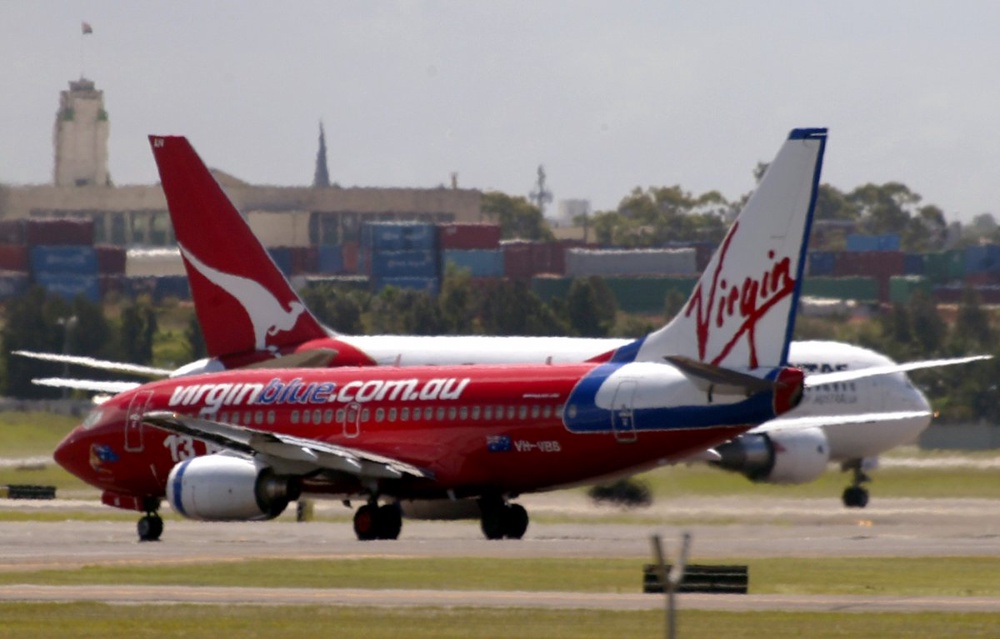
Australia's competition regulator plans to take a hard look at Virgin Australia's planned acquisition of low-cost rival Tiger Airways Australia over concerns about the market becoming a duopoly, AFP reports. Virgin announced an agreement Tuesday to buy a controlling 60 percent stake in Tiger Airways Australia, the loss-making local subsidiary of Singapore's Tiger Airways, as part of its battle with Qantas for domestic dominance. The airline also made a takeover offer for Perth-based Australian regional carrier Skywest, while Singapore Airlines took a 10 percent holding in Virgin Australia. But Australian Competition and Consumer Commission (ACCC) chairman Rod Sims said he was worried about the impact on consumers with two main airlines controlling the market, and vowed to examine the deals "extremely closely". "Yes, (Virgin) will be stronger to compete with Qantas -- that's the plus -- but they'll take out the remaining competitors to do it, and that's the negative," Sims said in an interview with the Australian Financial Review. "It will come down to what we think the alternative world would look like, what the barriers to entry are for other players coming in. We will look at this extremely closely, extremely deeply." In announcing the deals on Tuesday, Virgin Australia chief John Borghetti said the tie-up with Tiger and acquisition of Skywest was good for travellers and jobs. "These transactions will bring important benefits to Australia, driving growth in jobs, tourism and competition," he said. "It's good for consumers." If the deals receive regulatory and shareholder approval, it will boost Virgin's presence in the budget and regional markets and expand its fleet to 139 aircraft, with more than 9,000 workers. Australia has a lucrative domestic aviation market due to its vast distances. It has long been dominated by Qantas which services more than 50 destinations on nearly 5,000 flights per week.





Australia's competition regulator plans to take a hard look at Virgin Australia's planned acquisition of low-cost rival Tiger Airways Australia over concerns about the market becoming a duopoly, AFP reports.
Virgin announced an agreement Tuesday to buy a controlling 60 percent stake in Tiger Airways Australia, the loss-making local subsidiary of Singapore's Tiger Airways, as part of its battle with Qantas for domestic dominance.
The airline also made a takeover offer for Perth-based Australian regional carrier Skywest, while Singapore Airlines took a 10 percent holding in Virgin Australia.
But Australian Competition and Consumer Commission (ACCC) chairman Rod Sims said he was worried about the impact on consumers with two main airlines controlling the market, and vowed to examine the deals "extremely closely".
"Yes, (Virgin) will be stronger to compete with Qantas -- that's the plus -- but they'll take out the remaining competitors to do it, and that's the negative," Sims said in an interview with the Australian Financial Review.
"It will come down to what we think the alternative world would look like, what the barriers to entry are for other players coming in. We will look at this extremely closely, extremely deeply."
In announcing the deals on Tuesday, Virgin Australia chief John Borghetti said the tie-up with Tiger and acquisition of Skywest was good for travellers and jobs.
"These transactions will bring important benefits to Australia, driving growth in jobs, tourism and competition," he said.
"It's good for consumers."
If the deals receive regulatory and shareholder approval, it will boost Virgin's presence in the budget and regional markets and expand its fleet to 139 aircraft, with more than 9,000 workers.
Australia has a lucrative domestic aviation market due to its vast distances. It has long been dominated by Qantas which services more than 50 destinations on nearly 5,000 flights per week.

 +7 (777) 001 44 99
+7 (777) 001 44 99



 Қазақша
Қазақша Русский
Русский English
English














































